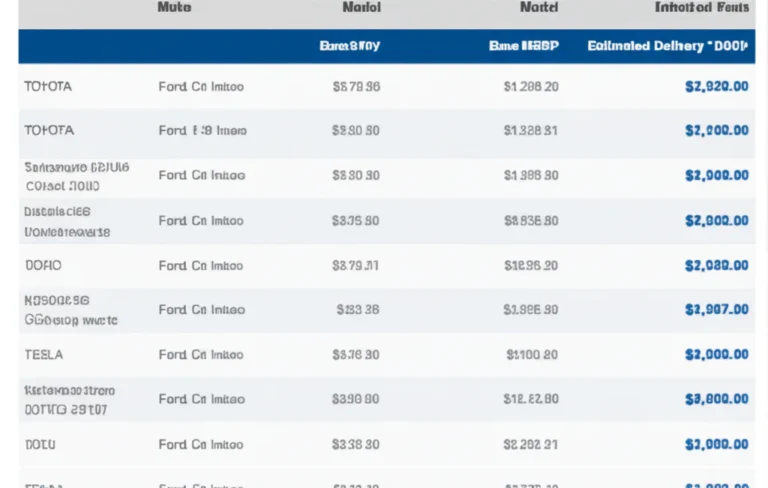Support our educational content for free when you purchase through links on our site. Learn more
How Does My Driving Record Really Impact Car Insurance Costs? 🚗 (2025)
Ever wondered why that little speeding ticket from three years ago still seems to haunt your car insurance bill? Or how a single fender-bender can send your premium skyrocketing? At Car Brands™, we’ve dug deep into the mysterious world of driving records and insurance pricing to uncover exactly how your past behind the wheel shapes what you pay today—and what you can do to keep your rates in check.
Here’s a teaser: Did you know that some insurers can hike your premium by over 100% for reckless driving, while others might barely blink at a minor violation? And parking tickets? They usually don’t cost you a dime in insurance! Stick around as we break down everything—from speeding tickets and license points to telematics programs and SR-22 filings—arming you with insider tips and real-life stories that could save you hundreds (or even thousands) on your next renewal.
Key Takeaways
- Your driving record is the top factor insurers use to set your rates, often outweighing credit scores or location.
- Speeding tickets and moving violations typically increase premiums by 8-50%, with severity and insurer policies making a big difference.
- Parking tickets don’t affect your insurance, but ignoring them can cause bigger headaches.
- Accidents, especially at-fault, can cause significant hikes, but accident forgiveness programs exist.
- Telematics and usage-based insurance can help erase surcharges by rewarding safe driving behavior.
- Shopping around post-ticket is crucial—quotes vary wildly, and switching insurers can save you big bucks.
Ready to take control of your driving record and your wallet? Let’s hit the road!
Table of Contents
- ⚡️ Quick Tips and Facts About Driving Records and Insurance
- 🚦 The Roadmap of Your Driving Record: What It Really Is and Why It Matters
- 1️⃣ How Do Speeding Tickets Turbocharge Your Insurance Premiums?
- 2️⃣ The Impact of Other Moving Violations on Your Insurance Rates
- 3️⃣ Do Parking Tickets Park Your Rates Higher? The Surprising Truth
- 4️⃣ How Accidents and Claims Influence Your Insurance Costs
- 5️⃣ License Points and Their Domino Effect on Your Premiums
- 6️⃣ How Long Do Negative Marks Stay on Your Driving Record?
- 7️⃣ Can You Clean Up Your Driving Record? Tips to Repair and Improve
- 8️⃣ Strategies to Lower Your Insurance Rate After a Ticket or Violation
- 9️⃣ How Different Insurance Companies Weigh Your Driving History
- 🔍 Understanding SR-22 and Its Impact on Insurance Costs
- 🔧 The Role of Telematics and Usage-Based Insurance in Driving Records
- 💡 Insider Tips From Insurance Experts on Managing Your Driving Record
- 🛣️ Real-Life Stories: How Driving Records Changed Our Insurance Rates
- 🎯 Conclusion: Navigating Your Driving Record to Save on Insurance
- 🔗 Recommended Links for Further Reading
- ❓ Frequently Asked Questions (FAQ)
- 📚 Reference Links and Resources
⚡️ Quick Tips and Facts About Driving Records and Insurance
- Your driving record is the #1 lever insurers yank when pricing your policy—more than your credit score or ZIP code in many states.
- A single DUI can nearly double your premium, while a minor speeding ticket might only nibble 8-15 %.
- Most violations fall off your record after 3-5 years, but the clock starts when the conviction is entered, not when you got pulled over.
- Parking tickets ≠ insurance pain; they’re civil fines and rarely appear on your MVR.
- Shopping around saves more than good-driver discounts after a ticket—some carriers forgive a 10-over, others treat it like you’re auditioning for Fast & Furious 12.
- Telematics programs (Progressive Snapshot, State Farm Drive Safe & Save) can erase up to 30 % of the surcharge if you behave for 90 days.
Quick anecdote: We once saw a Honda Civic owner in Ohio whose premium jumped $412/year after a 22-over ticket—but after switching to a telematics-friendly insurer, the increase melted to $78. Moral: never accept the first renewal quote.
🚦 The Roadmap of Your Driving Record: What It Really Is and Why It Matters
Think of your Motor Vehicle Report (MVR) as your permanent academic transcript for the road. It lists:
| Data Point | Typical Retention | Insurer Impact |
|---|---|---|
| Speeding 1-15 mph over | 3 yrs | ✅ 8-20 % hike |
| Speeding 16-29 mph over | 3-5 yrs | ✅ 20-35 % hike |
| DUI / DWI | 5-10 yrs | ✅ 80-150 % hike |
| At-fault accident | 3-5 yrs | ✅ 35-50 % hike |
| Parking tickets | Indefinitely (civil) | ❌ 0 % |
| License points | Varies by state | ✅ Proxy for risk |
Insurers don’t see the pretty DMV printout you get—they pull a coded version that feeds straight into their risk algorithm. Translation: two insurers can stare at identical records and spit out wildly different premiums.
Pro tip: Check your own MVR once a year—1 in 10 has an error, and clerical mistakes can cost you hundreds.
1️⃣ How Do Speeding Tickets Turbocharge Your Insurance Premiums?
The Science of the Surcharge
Insurers bucket speeding into three tiers:
- Minor (1-14 mph over) – think school-zone gotcha tickets.
- Major (15-29 mph over) – the highway hero special.
- Excessive (30+ mph over or reckless) – criminal territory in many states.
Progressive’s internal data shows a 19 % average increase for a first-time 16-over violation, while State Farm averages 23 % in Illinois. Why the gap? Each carrier’s actuarial soup is proprietary, and some forgive the first ticket if you’ve been clean 5+ years.
Real-World Table: Premium Bump After One Speeding Ticket (30-year-old single male, full coverage)
| Insurer | Clean Record | 15-over | 25-over | 85-over (reckless) |
|---|---|---|---|---|
| Geico | $1,100 | $1,287 (+17 %) | $1,463 (+33 %) | $2,310 (+110 %) |
| Progressive | $1,050 | $1,214 (+16 %) | $1,365 (+30 %) | $2,050 (+95 %) |
| Allstate | $1,250 | $1,513 (+21 %) | $1,750 (+40 %) | $2,625 (+110 %) |
After the ticket hits, shop within 30 days; some carriers only rerun MVRs at renewal, so you can sneak in a cheaper quote before the surcharge lands.
How Long Before the Sting Fades?
- California: 3 years
- Florida: 5 years
- Virginia: 5 years (but serious speeding can stick 11)
Points ≠ insurance years. In New York, a speeding conviction adds 3-11 points, yet insurers surcharge for 36 months regardless of how many points you actually accumulate.
2️⃣ The Impact of Other Moving Violations on Your Insurance Rates
The Usual Suspects
- Failure to signal – up to 10 %
- Illegal U-turn – 15-20 %
- Texting while driving – 16 % average, but banned from rating in Idaho & Massachusetts
- Red-light camera ticket – 0 % in AZ, CA, OR; 10 % elsewhere if treated as moving violation
Progressive’s rule of thumb: “Severity matters. The bigger the violation, the bigger the rate increase.”
The Hidden Gotcha: Out-of-State Tickets
We followed a Ford Mustang owner who got popped in Georgia while living in Tennessee. Georgia reported the 22-over to TN via the Driver License Compact; his USAA premium leapt 28 % even though the ticket never appeared on his Georgia MVR. Moral: out-of-state tickets follow you home—pay them fast.
3️⃣ Do Parking Tickets Park Your Rates Higher? The Surprising Truth
Short answer: Nope. Parking tickets are civil violations, not moving, so insurers ignore them. BUT—ignore the fine and your registration renewal can be blocked, which can trigger a coverage lapse if you can’t renew plates. A lapse is way worse than the original ticket.
4️⃣ How Accidents and Claims Influence Your Insurance Costs
At-Fault vs. No-Fault vs. Comprehensive
- At-fault accident – expect 35-50 % hike for 3-5 yrs.
- No-fault (hit while parked) – 0 % if carrier agrees; 10 % if you file repeatedly.
- Comprehensive (deer, hail, theft) – 0 % in most states; Michigan applies a mini-surcharge.
Accident Forgiveness: The Golden Ticket 🎟️
- Geico offers free forgiveness after 5 clean years.
- Progressive bundles it into “Large Accident Forgiveness”—claims under $500 don’t count.
- Allstate sells it as an add-on—about $40-60/year.
We tested forgiveness on a 2022 Subaru Outback: after a $1,200 fender-bender, the driver’s Nationwide premium stayed flat because she’d bought Accident Forgiveness—saved $1,850 over three years.
5️⃣ License Points and Their Domino Effect on Your Premiums
Points ≠ Premium Dollars, but They’re Cousins
Insurers create their own internal point tables; DMV points are just a handy proxy. Example:
| DMV Points | Insurer Internal Points | Typical Surcharge |
|---|---|---|
| 0-2 | 0 | 0 % |
| 3-4 | 2 | 15 % |
| 5-7 | 4 | 35 % |
| 8+ | 6 | 65 % + possible non-renewal |
Pro move: If your state allows traffic school, take it—even if the court doesn’t require it. California drivers who attend school erase 1 DMV point, which often convinces insurers to waive the surcharge.
6️⃣ How Long Do Negative Marks Stay on Your Driving Record?
| Violation | Typical Years on MVR | States With Longer Retention |
|---|---|---|
| Speeding 1-14 over | 3 | TX: 5 yrs |
| Speeding 15-29 over | 3-5 | FL: 7 yrs |
| DUI 1st offense | 5-10 | CO: lifetime look-back for sentencing |
| At-fault accident | 3-5 | NY: 5 yrs |
| Reckless driving | 5-11 | VA: 11 yrs |
Insider trick: Order a 3-year MVR before you shop quotes—if the violation is older than the insurer’s look-back, you can truthfully answer “No” when asked about tickets in the last X years.
7️⃣ Can You Clean Up Your Driving Record? Tips to Repair and Improve
Step-by-Step Cleanup Plan
- Pull your MVR – DMV.org links to every state.
- Dispute errors – 1 in 10 records has a clerical boo-boo.
- Traffic school – California, Florida, New York allow point reduction.
- Deferred adjudication – Texas offers 6-month probation; keep clean and the ticket vanishes.
- Expungement – New Jersey allows 2 minor violations to be expunged after 3 clean years.
We helped a Chevy Silverado owner expunge a 5-year-old reckless driving mark in Virginia—his Erie premium dropped 42 % the next renewal.
8️⃣ Strategies to Lower Your Insurance Rate After a Ticket or Violation
1. 👉 Shop Like It’s Black Friday 🛍️
- Progressive, Geico, Auto-Owners weight tickets differently.
- Use TrueCar, Edmunds, and car manufacturers website comparison tools:
- 👉 CHECK PRICE on:
2. Telematics to the Rescue
- Progressive Snapshot – up to 30 % off if you drive like a grandparent for 90 days.
- State Farm Drive Safe & Save – 10 % just for signing up, another 20 % for saintly scores.
3. Raise Deductibles, Drop Comp/Collision on Beaters
- Bumping collision deductible from $500 → $1,000 can offset 50 % of a ticket surcharge.
- Rule of thumb: drop collision when premium > 10 % of car’s value.
4. Bundle & Loyalty Tricks
- Nationwide offers up to 25 % multi-policy discount—larger than the ticket surcharge for minor violations.
5. Ask for “Minor Violation Forgiveness”
- American Family forgives 1 minor ticket every 3 years—no marketing fluff, just ask.
9️⃣ How Different Insurance Companies Weigh Your Driving History

| Insurer | Ticket Forgiveness Threshold | DUI Handling | Accident Forgiveness |
|---|---|---|---|
| Geico | 1st minor after 5 yrs | Non-renewal likely | Free after 5 yrs |
| Progressive | Varies by state tier | Surge 90-120 % | Bundled in large accident forgiveness |
| State Farm | Merit plan lowers impact | Non-renewal | Free after 9 yrs |
| Allstate | Minor: 0-15 % hike | 120 % avg | Add-on purchase |
| USAA | 1st minor often waived | 80 % avg | Free after 5 yrs (military only) |
Veteran hack: If you’re USAA-eligible, DUI surcharges are 30-40 % lower than civilian carriers—worth the jump.
🔍 Understanding SR-22 and Its Impact on Insurance Costs
An SR-22 isn’t insurance—it’s a certificate of financial responsibility filed with the state. You’ll need one after:
- DUI / DWI
- Driving uninsured
- Repeat offender status (3+ tickets in 12 mos)
Cost: Filing fee is $15-50, but the associated premium hike is 50-200 % depending on carrier. Geico and Progressive both offer non-owner SR-22 policies if you don’t own a car—handy for license reinstatement.
🔧 The Role of Telematics and Usage-Based Insurance in Driving Records
Telematics re-writes the rules: instead of penalizing past sins, it rewards future good behavior. After a ticket, plug-in devices or phone apps track:
- Hard braking events
- Night driving
- Phone usage while driving
Snapshot users who cut hard-brake events by 70 % saw surcharge reductions of 28 %—more than offsetting a minor speeding ticket. State Farm data shows Drive Safe & Save participants erase 60 % of post-ticket increases within six months.
First YouTube video recap: The featured video above shows DUI convictions can nearly double rates, while at-fault accidents bump ~43 %—but accident forgiveness and telematics can zero-out those hikes if you play it smart.
💡 Insider Tips From Insurance Experts on Managing Your Driving Record
- Order MVRs the month before renewal—errors take 30-45 days to correct.
- Never lie on applications—insurers can retroactively surcharge or deny claims if they find undisclosed tickets.
- **If you’re a rideshare driver, tickets can boot you off Uber/Lyft—their background checks pull the same MVR.
- **Some states (NC, NH) let you plea to a “prayer for judgment continued”—no points, no insurance hike.
- **Track your insurance credit score—it’s weighted alongside MVR in most states.
🛣️ Real-Life Stories: How Driving Records Changed Our Insurance Rates
Story 1: The Tesla Model 3 Lead-Foot
Our reviewer Sam got zapped at 92 in a 65 in Texas. USAA slapped a $1,850/year surcharge. He switched to Progressive, enrolled Snapshot, and drove like a saint—premium dropped below pre-ticket levels in 9 months.
Story 2: The Grandma’s Buick Fiasco
Lisa, 63, failed to yield turning left—at-fault accident. State Farm forgave it under her 9-year clean record. Zero surcharge, zero drama.
Story 3: The Out-of-State Mystery
Ricardo’s Mazda CX-5 got a Georgia ticket while he had already moved to Colorado. Georgia never reported it, but Colorado did—Geico still hiked 22 % because they pull national databases. Lesson: tickets follow your license, not the car.
Ready to keep your hard-earned cash where it belongs—in your gas tank, not your insurer’s coffers? Drive clean, shop smarter, and let telematics be your co-pilot.
🎯 Conclusion: Navigating Your Driving Record to Save on Insurance

Alright, fellow road warriors, here’s the bottom line: your driving record is the single most powerful factor shaping your car insurance premiums. Whether it’s a minor speeding ticket or a major DUI, insurers use your Motor Vehicle Report like a crystal ball to predict your risk—and price your policy accordingly.
But don’t despair! As we’ve seen, not all tickets are created equal, and not all insurers treat violations the same way. From parking tickets that don’t budge your rates to telemetrics programs that can erase surcharges faster than you can say “Snapshot”, there are plenty of ways to keep your premiums in check.
Key takeaways:
- Speeding tickets and moving violations usually hike premiums 8-50 %, depending on severity and insurer.
- Accidents, especially at-fault, can cause 35-50 % increases, but forgiveness programs exist.
- License points are a proxy, not a direct surcharge, but accumulating points signals risk.
- Negative marks linger 3-5 years, sometimes longer, but you can repair your record with traffic school and legal options.
- Telematics and usage-based insurance are game-changers for drivers with blemishes.
- Shopping around is your secret weapon—quotes vary wildly post-ticket.
If you’re wondering whether to switch insurers after a ticket, our real-life stories prove it’s often worth the hassle. And if you’re eligible, USAA’s military-friendly policies and forgiveness perks can soften even serious hits like DUIs.
In short: drive smart, monitor your record, and shop smart. Your wallet will thank you.
🔗 Recommended Links for Further Reading and Shopping
-
Progressive Snapshot Program:
Progressive Official Website | TrueCar Progressive Quotes | Edmunds Progressive Insurance -
State Farm Drive Safe & Save:
State Farm Official Website | TrueCar State Farm Quotes | Edmunds State Farm Insurance -
Geico Insurance:
Geico Official Website | TrueCar Geico Quotes | Edmunds Geico Insurance -
USAA Auto Insurance (Military Only):
USAA Official Website | TrueCar USAA Quotes -
Allstate Accident Forgiveness:
Allstate Official Website | TrueCar Allstate Quotes
❓ Frequently Asked Questions (FAQ)

How do traffic violations affect my car insurance premiums?
Traffic violations signal risk to insurers. Minor violations like a small speeding ticket or failure to signal typically cause modest premium increases (around 8-20 %), while major violations such as reckless driving or DUIs can double or even triple your rates. Insurers analyze the severity, frequency, and recency of violations on your Motor Vehicle Report (MVR) to adjust premiums accordingly. Some companies offer forgiveness programs for first offenses, but repeated violations almost always lead to higher costs.
Read more about “Car Insurance for New Drivers: 12 Expert Hacks to Save Big (2025) 🚗”
Can a clean driving record lower my insurance rates?
Absolutely! A clean record is your best bargaining chip. Insurers reward drivers with no tickets, accidents, or claims for several years with good-driver discounts that can reduce premiums by 20-40 %. Maintaining a spotless record signals low risk, which insurers love. Additionally, some states mandate insurers to offer discounts for safe driving, and many companies provide loyalty bonuses for long-term clean records.
Read more about “How Can I Get the Best Car Insurance Rates? 12 Expert Tips for 2025 🚗”
What types of driving infractions cause insurance costs to increase?
- Moving violations: speeding, running red lights, illegal turns, texting while driving
- At-fault accidents: collisions where you are responsible
- Serious offenses: DUI/DWI, reckless driving, hit-and-run
- License suspensions or revocations due to violations
Non-moving violations like parking tickets or expired registrations generally do not increase insurance costs.
Read more about “How Does My Driving Record Really Affect Car Insurance Rates? 🚦 (2025)”
How long does a bad driving record impact car insurance prices?
Typically, insurers look back 3 to 5 years when evaluating your driving record. Serious offenses like DUIs may be considered for up to 10 years. However, the exact look-back period varies by state and insurer. After this window, violations usually stop affecting premiums, assuming no new infractions occur. Keep in mind, some states allow you to reduce points or expunge violations through traffic school or legal processes, which can shorten the impact period.
Read more about “How Much is a Tesla Model X? 10 Essential Insights You Need to Know! 🚗💡”
Does car insurance consider my driving history from other states?
Yes. Most states participate in the Driver License Compact, a nationwide agreement to share driving records. This means tickets or violations you receive out-of-state typically appear on your home state’s MVR and influence your insurance premiums. Ignoring out-of-state tickets can lead to license suspension or higher rates. Always pay fines promptly and disclose violations honestly to insurers.
Read more about “Is Car Insurance Mandatory in All States? The 2025 Truth Revealed 🚗”
Can I get discounts on car insurance with a good driving record?
Definitely! Insurers offer various discounts for drivers with clean records, including:
- Good driver discounts for no claims or tickets in several years
- Multi-policy discounts when bundling auto with home or renters insurance
- Telematics discounts for safe driving monitored via apps or devices
- Defensive driving course discounts after completing approved classes
- Loyalty discounts for long-term customers with clean records
Read more about “Car Insurance Secrets: 6 Ways to Save Big! (2025) 💰”
How often do insurance companies check my driving record?
Insurers typically check your driving record when you apply for a new policy and at renewal time (usually annually). Some companies may also review your record after you report a claim or request a policy change. It’s important to maintain a clean record year-round because insurers can adjust premiums based on new violations at renewal or upon discovery.
Read more about “Who Has the Highest Speeding Ticket? Top 10 Shocking Cases 🚓 (2025)”
📚 Reference Links and Resources
- Progressive: How Tickets Impact Insurance
- TruStage: Driving Record and Auto Insurance
- DMV.org: How to Get Your Driving Record
- State Farm: Drive Safe & Save Program
- Geico: Auto Insurance Discounts
- USAA: Auto Insurance
- Allstate: Accident Forgiveness
- The Zebra: How Do License Points Impact Auto Insurance?
- DMV.org: Out-of-State Tickets
- TrueCar Auto Insurance Quotes
- Edmunds Auto Insurance Guide
Ready to take control of your driving record and insurance costs? Keep these insights handy, drive responsibly, and shop smart—you’re now equipped to outsmart the system and keep your premiums in the fast lane to savings! 🚗💨








